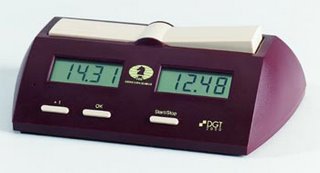Chess Culture. Club Boylston.
As a player who is often short of time at the first time control, I've always been a bit peeved by the arrangement in which, if using a clock with time-delay (or perhaps more commonly, a clock with time-increment, but I'll generally use time-delay to refer to both here) giving each player +5 seconds for each move made (by the respective player), the initial time allotment for the first time control is reduced by 5 minutes.
For example, if the first time control is 40 moves in 2 hours (and the next and final time control is G/60), players using clocks without time-delay would initially set their clocks to give each player a full 2 hours, but players using a time-delay clock would initially set their clocks to give each player only 1 hour and 55 minutes for the first 40 moves. At the end of 40 moves, a player using such a time-delay clock would have earned ("back") an additional 3 minutes and 20 seconds (40 moves x 5 = 200 seconds), but would still have had slightly less time to make the first time control.
In the above example, only if your game exceeds 60 moves would the time-delay actually give you more average time per move. If your game ends after fewer than 60 moves, as the majority of mine (and yours, I suspect) do, you'd actually get less average time per move if you use a clock with time-delay than if you use a clock without it.
For a reasonably slow first time control, if faced with the 5 minute reduction of initial time allotment for time-delay clocks, it would seem more often advantageous to use a clock without time-delay, at least with respect to the average time you get per move for the first time control, which is often the decisive time control.
Tournament directors might impose the 5 minute reduction to ease scheduling of subsequent rounds happening on the same day. A few years back, I was told that the Mass(achusetts) Open used the 5 minute reduction because Bill Goichberg uses it in his large tournaments; given the prominence of Goichberg's tournaments, it seems perfectly normal that others would follow his lead. Even in the days before time-delay clocks, my recollection is that it was pretty common for the 2nd of 2 rounds for a day to be delayed beyond its announced starting time, although back then automatic pairing programs to speed up directing tasks weren't available. If 2nd (or later) rounds of a day typically start punctually these days, I wonder how frequently that might be attributed to the 5 minute reduction.
On the other hand, a time-delay clock is markedly more likely to be beneficial for games with a single, sudden death time control, since it's the only way you'd ever get more time than the nominal time control. This was eminently clear when I faced Little Mr. Grown Up during a G/30 tournament at the club. I'm glad he didn't greet me by saying,
"Your powers are weak, old man."(even if they are).
Early in our game I reached the following position as White after 13...Bxd5:

I managed to restrain myself from playing 14 Qxc5??, which would have been convincingly answered by 14...Nxe2 mate. After 14 Qd1 fxg5 15 Bxg5, I was up a queen and a pawn for two active minor pieces.
Subsequently, despite taking my usual long thinks, I did not prove equal to the task of driving home my material advantage. With my opponent having a healthy chunk of time remaining (according to my recollection) and myself being left with very little, we arrived at the following position after Ke2-f1 (I had stopped recording moves, but we may not even have reached move 50):

With my king repeatedly shuttling between e2 and f1, and his king similarly shuttling between a6 and b7, I offered a draw, which was of course accepted.
Perhaps if we had not been using a time-delay clock I could have claimed a draw through the director due to "insufficient losing chances". However, with a time-delay clock there would presumably be no need to call for the director.
Other factors might affect whether you are likely to benefit from using a time-delay clock in any given game, including how fast of a player you and your opponent are, the different time controls for the game, the sharpness of the variation you land in, whether you got confused about the round's starting time and arrive almost one hour late for the start of your game (yah, you're welcome for that so many years ago, Harold Dondis ;-) ), etc.
Nowadays, I generally only play in club events that have 1 game per day, where the 5 minute reduction is typically not (or never?) imposed for time-delay clocks. Thanks to Bob Oresick, I recently learned that my Bronstein time-delay clock is acceptable for USCF tournament games. For some time I had been under the mistaken impression that only Fischer time-increment clocks were acceptable, but maybe later I'll write about the adjournment play-off which led to my confusion, which happened to include an interesting endgame (yeah, I might get around to analyzing that thoroughly in a decade or two).

